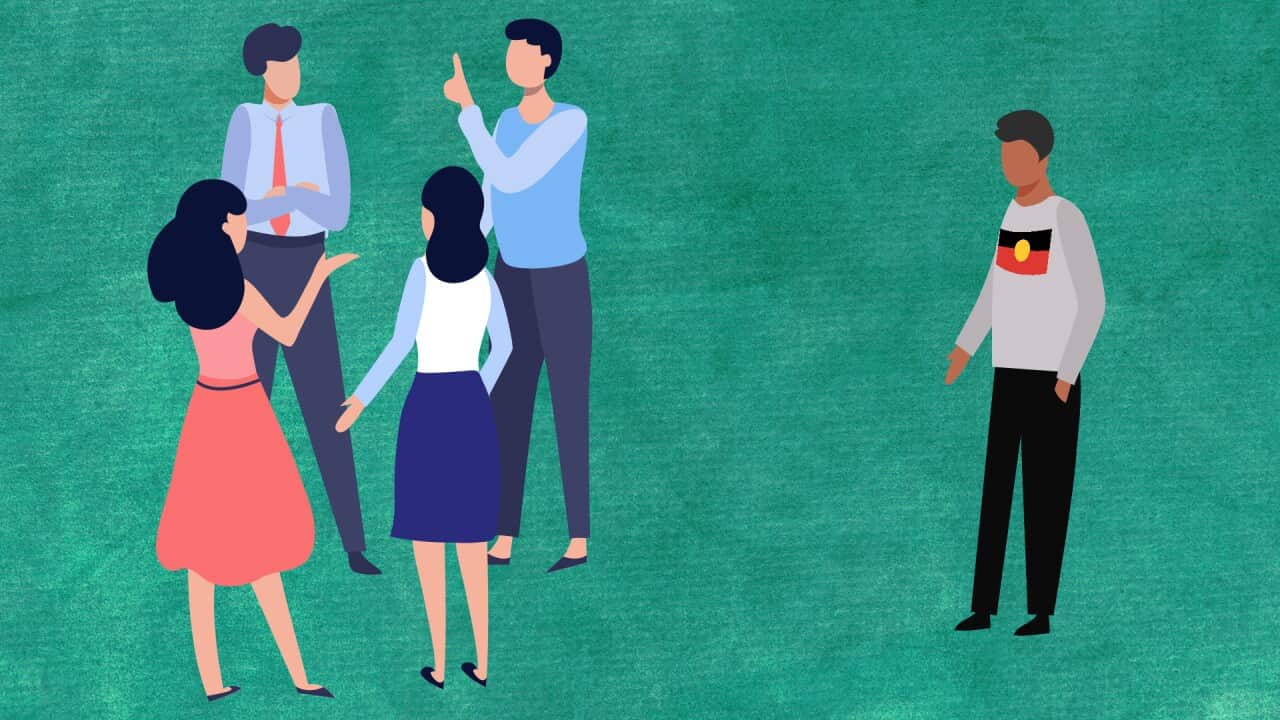For a lot of mob, feeling culturally safe at work is something we can struggle with.
A lack of cultural competence and cultural understanding in the workplace can affect our sense of belonging and put a strain on our cultural identities.
It could be that you feel like you have no one at work who you can relate to, or that there's a lack of Blak representation and leadership. It could be microaggressions or that you're made to feel as though you're being 'too much'.
Whatever your experience with cultural safety or a lack thereof may be, it is our right to feel safe at work.
And while there is legislation that aims to protect the safety of all people in workplaces, systemic racism continues to exist and affect the lives of mob.
What is cultural safety
Cultural safety is an environment where someone's cultural identity is not under threat, but rather valued, in the workplace.
Rob Hyatt is a Wotjobuluk and Gunai/Kurnai man and Cultural Education Manager for the Koorie Heritage Trust in Naarm, which provides educational workshops on cultural safety.
Mr Hyatt says it's historical notions of 'tolerance' are no longer appropriate in the modern workplace.
"When we talk about culturally safe spaces, tolerance and acceptance are not enough," he said.
"For whatever it is that makes you who you are, that needs to be valued and respected ... for mob, you don't have to change the person that you are to fit into a workplace, your workplace should make you feel like it's okay to be you," he added.
When mob feel culturally safe at work, the impacts are far-reaching.
Cultural safety can foster a sense of acceptance, community and belonging.
Craig Leon is a Worimi man who has completed academic research around cultural competency and unconscious bias towards mob in the workplace.
"[It can result in] increased productivity and going above and beyond ones duties to support the organisation because you have an affinity to the organisation and feel that the organisation understands and respects who you are as an individual," Mr Leon said.
What can culturally unsafe behaviours look like?
Culturally unsafe behaviours in the workplace can include stereotyping, discrimination, prejudices, and racism.
These kinds of behaviours can have a significant impact on mob not just in the workplace, but can carry over into their personal lives.
When mob feel culturally unsafe, it can put a strain on their identity.
"If we don't understand people's identity and their culture, it can't be expected for them to be treated equitably with other colleagues," Mr Leon said.
Mr Leon says a form of racism that is often experienced in the workplace are microaggressions, which can be difficult to call out.
"Racism doesn't just have to be blatant. They can also be more subtle and more hidden. They can also be microaggressions, which are more unnoticeable acts," he said.
When organisations enable culturally unsafe work behaviours, Mr Leon says it can have irreversible effects.
"If it's not dealt with then it can become institutionalised into the culture of the organisation and that's really hard to change.
"They might not feel valued, trust management or feel their voice matters," he said.
Mr Hyatt spoke about the impact of enduring stereotypes and preconceived notions of identity.
"When we face bias and unconscious bias, there's already a perception of who you are as an actual person which can be damaging," he said.
On top of the racism and prejudice that mob experience on a daily basis, it can be incredibly damaging when we're unable to escape that while simply doing our jobs.
"We face a lot of unsafe practices in everyday life ... there's assumptions made about you, stereotypes about you ... racism and systemic racism impacts our everyday life. So when you step into a job, you shouldn't have to face that.
"When you continue to feel unsafe within a workplace, then it's much more damaging not just to you within that role, but it hurts you as a person, it hurts your family, it hurts your community," he said.
How can organisations make their workplaces culturally safe?
Organisations being able to genuinely see the value that Aboriginal and Torres Strait Islander peoples bring to the workforce is a start.
And there's lots of way for workplaces to show that they do care about our people, that go beyond a ten minute power point labelled as cultural awareness training.
These include organisations respecting and acknowledging their Aboriginal and Torres Strait Islander staff's experiences (without the added ) and making sure that mob are represented (that also means in leadership positions).
It should also include engaging your organisation with Blak businesses and community organisations, showing and investing in the growth of their First Nations employees and acknowledging their own privileges and biases.
Mr Leon also says reconsidering colonial approaches to First Nations employees is an importnat step.
"Employers need to try and see things through our eyes because once they do that, then you can better understand us.
"To be culturally safe and to be culturally competent is underpinned by having building sustained, positive relationship with First Nation peoples. And that requires trust. "
From his own experience, Mr Hyatt says that engaging in cultural workshops is a good starting point.
"Education is really important. There's a lot of great organisations doing some amazing work in these sort of spaces. So there's ways to learn, there's ways to engage and get a better understanding in the first place," he said.
It also needs to be made clear that it is the responsibility of organisations to be accountable for any unconscious biases that may exist, racism and discrimination.
"Breaking down the myths and stereotypes of who you think you're employing. Employers need to be able to educate themselves and not label us. I think that's a real strong starting point," he said.














